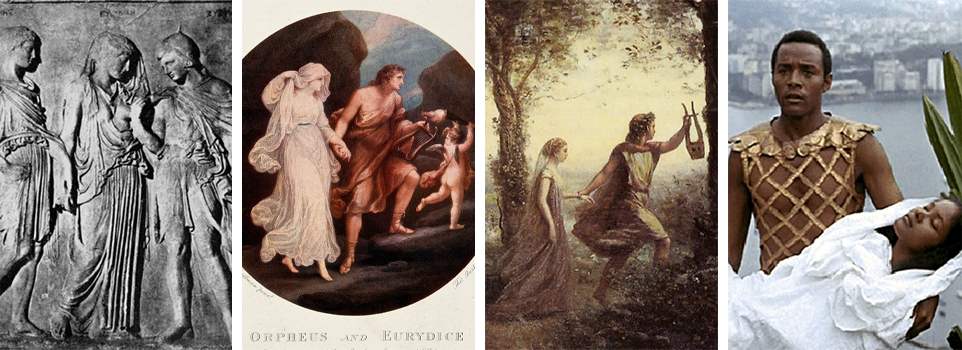Why do some stories survive thousands of years while others are quickly lost? Many factors affect an ancient text's chances of survival, but most important is power. If we understand how texts have survived with the aid of each generation's most empowered, can we then predict which modern classics will survive?

Submitted by Anonymous on Tue, 22/09/2020 - 12:53
From the Classic to the Classical: Orpheus and Eurydice.
What makes something Classical?
Can we guess what will be Classical two thousand years from now?
The answer lies in hell.
Located at the Walter Kerr Theater in New York City, the musical Hadestown, in its first run, swept the Tony Award season, securing 14 nominations and winning eight awards including Best Broadway musical and Best Original Score.
Hadestown retells the Grecian myth of Orpheus and Eurydice. Orpheus is the son of a Muse, a bard who creates music so beautiful that all of nature – trees, men, and beasts – are entranced by him. His songs charm the young Eurydice. They fall in love. They marry. She dies. Orpheus is so distraught at her death that he journeys to the underworld and begs Hades to restore Eurydice to him. Hades agrees to let Eurydice go so long as, on the journey out of the Underworld, Orpheus never looks behind him to where Eurydice would be silently following. Orpheus sets out and Eurydice follows. Near the end of the journey, Orpheus begins to doubt that Eurydice is truly behind him. They nearly reach the exit. He looks back. She dies.
Anaïs Mitchell’s Hadestown is the latest in a long line of adaptation that connects storytellers as near as Jean Cocteau’s 1950 film Orphée and as far as Virgil’s Georgics. Because of the play’s form, its ancient plot, and its critical reception on Broadway, Hadestown has readily been labelled as a modern classic. Should we predict then that, in two thousand years, excerpts of Hadestown will be featured in some future student’s ancient English textbook?
Though I certainly won’t be around to see this bet to the end, I’d wager that Hadestown is particularly well positioned to survive the next two thousand years because of how it talks about, but never quite challenges, power.
FROM THE FIFTH CENTURY, WITH LOVE
There were countless authors throughout antiquity who wrote countless texts. Novels, poetry, plays, speeches. We are able to study antiquity in large part by reading and understanding these texts. Though, even from societies like ancient Rome, which placed such an emphasis on literacy and preservation of the written word, not every single text that was ever produced has also survived.
What texts we can read now are only a small fraction of what was written. Several conditions factored into a text’s survival odds. Things such as popularity and general usefulness significantly contributed to a text’s odds in ways that are worth reflecting on but the most important factor that all too often decided whether or not a text survived the turns of various new ages was power. Notions of power created, and intimately defined, the Classical canon as we know it today.
POLITICS OF POPULARITY The politics of popularity are fairly straightforward. Surviving texts often had great popularity and greater popularity meant more widespread distribution and more distribution meant more copies in more places which increased the likelihood of survival. For instance, many fragments of the Athenian playwright Meander were found among the Oxyrhynchus papyri. Oxyrhynchus had the largest theater in the whole of Roman North Africa during the second century CE indicating they were a community with a heightened focus on theater. Thus, many plays – including Menander’s – travelled throughout the Mediterranean to reach the Oxyrhynchi audiences. Once arrived in Egypt a text, as a physical object, had a much higher chance of survival due to Egypt’s drier, arid environment.
Additionally, some texts went even further – going beyond popularity to achieve generic status. Homer and Euripides were as popular to see performed as they were to be used in reading and writing exercises in schools. In learning how to write and read, a single student could require and create many textual copies.
USEFULNESS Even if a text wasn’t particularly popular, if it touched on enough relevant topics, then its continued usefulness could have helped it reach the modern day. The Natural Histories is a perfect example of this. The Histories is a hefty 37-book scientific encyclopedia from the first century CE as collected by Pliny the Elder, a Roman Equestrian who is best known for dying at Pompeii. It couldn’t have been often that a slave would be requested to recite selections of the Histories at a dinner party for the sake of popular entertainment.
While the veracity of the facts listed in the encyclopedia were considered dubious even in antiquity, nevertheless, its contents have always proven extremely useful to researchers with a wide range of interests. Useful enough to have been repeatedly copied so that all books still survive today.
INTERVENTIONS OF POWER The defining factor, though, which ultimately decided which texts survived from antiquity and which did not was power. As societies change and as each new institution comes into power, texts are re-scrutinized by the enfranchised who decide which texts are important and which are not. This decision, of course, is inseparable from a question of which texts reinforce the desired power dynamics of the elites and which threaten those dynamics. Texts that reinforced existing power structures in antiquity were elevated to importance. Thus, these are to be considered Classical as in the etymological sense of the word – they were of, or belonging to, the highest class of citizen. In this higher position, a text would have enjoyed increased circulation and, as a result, a much better chance of survival.
Texts that did not reinforce cultural norms on the other hand – ones that challenged the prevailing ideologies of the time – these ones were deemed unimportant and kept out of circulation or at the most extreme, they were burned.
When the Christian Church began its rise to power following its decriminalization in 313 CE, texts like Lucretius’ De Rerum Natura were disfavored by the new Christian power. Lucretius’ six-volume epic poem was one of the first to try to transmit Greek Epicurean philosophy which, at its core, is dedicated to answering one question: “What makes people happy?” Unfortunately, the Epicurean answer to this was rather sacrilegious as they deduced that God must be either not present in this world or just non-existent and, moreover, organized religion was merely a way to control men. Epicurean texts were shunned and forced into obscurity as Christians consolidated power in the West.
Luckily, the De Rerum Natura contained just enough usefulness in its observations on atomic theory and arguably enough popularity in its artfully written imagery that it managed to survive to reach one wealthy fifteenth century Florentine who so crucially brought the text into the age of the all-important printing press.
TO INFINITY Since the invention of the printing press, the loss of texts has ceased to be a passive activity. Those who hold power in these modern eras now must actively seek out and eradicate texts since reproduction and dissemination could occur so rapidly. Most eradication efforts failed. Severe mitigation became the next best option. By the sixteenth century, publicly supporting the philosophies expressed in the De Rerum Natura could result in a gruesome death sentence but despite this circulation persisted. Now, reading technologies have advanced to a point where even mitigation is near impossible because of the many uncontrolled and unexpected ways texts can appear on the internet.
But in times of plenty, new problems emerge. Understanding which texts will survive to come to define our modern period – becoming the classical texts of tomorrow – is now a question of which texts will speak loudest to be heard above the clacking din of a billion keyboards. Here, as before, is where the politics of power will prove most crucial, amplifying some voices and silencing others.
MAKING THE CUT So, let’s return to Hadestown. The play is not particularly useful in that not many of us will need a guide on surviving sing or die situations, but it is intensely popular – fans have already started something of a cult following of the show. Popularity alone though won’t ensure the play is set apart from the billions of other data points existing both on and offline.
What will set Hadestown apart is the fact that for all the modern issues the play alludes to –climate change, labor exploitation, immigration – the play never once challenges the viewer to critique the power behind these issues. In fact, it does just the opposite. Hades is exonerated and Orpheus is held responsible and Eurydice is condemned.
What’s more, as Hermes so sings in the last reprise
It’s a sad song. It’s a sad tale.
It’s a tragedy...
But we sing it anyway.
Hadestown puts forth that hope is repetition. Believing that things might get better if they continue in the same way. This runs counter both to the nature of theater and to the in-line perspective of Orpheus himself: both are supposed to see the world as it could be.
Orpheus did look back. Eurydice did die. The way out of hell did close for all humanity. That is, in fact, how the story has gone. But by yielding to this, Hadestown participates in a larger turn in which the glamour of hearing, seeing, and commiserating with the oppressed all too often masks a reality of refusal to break with tradition, refusal to do the laborious work of imagining a hopeful future. The classicizing miracle of Hadestown is that it looks like progress yet encourages complacency through hopelessness.
And so, it is my opinion that Hadestown will become a Classic. If I’m being pessimistic, it will achieve this status under a power structure that will look very much like the one that exists now. But if I were hopeful...
If I were hopeful, Hadestown would one day become a Classic but only because it so perfectly displayed the archaic modes of ideology regulation employed by the ruling class of the early twenty first century. Modes that would be alien to the ancient English student of the future because what hopes we have now for a future free of rampant irresponsibility were at long last fully realized. This future is much brighter.
(left to right) Wellcome Collection, Licence: CC BY 4.0; Wellcome Collection, Licence: CC BY 4.0; Public domain; Film still from "Black Orpheus", public domain.



